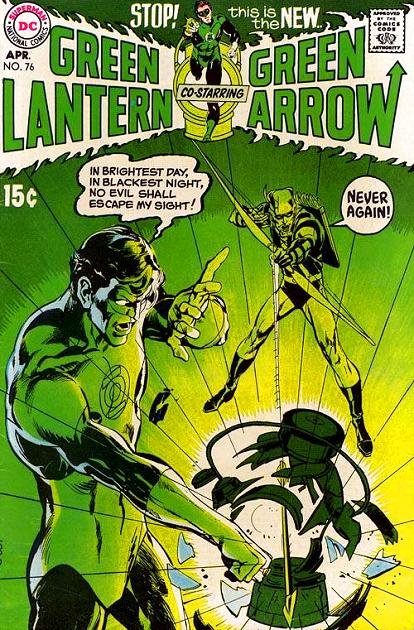Blogger Greg Burgas stakes out a controversial claim: that comic books are fundamentally conservative, not liberal.
The political leanings of superhero comics ... revealed!By Greg BurgasNo superhero comic from Marvel or DC is liberal in the truest sense of the word, challenging the status quo. Occasionally writers from outside the mainstream superhero world write a superhero comic that does challenge the status quo. What do they often come up with? A left-leaning dictatorship, much like Stalin's Russia or Mao's China. This is perhaps the consequence when superheroes take over--they are really the ultimate in "governmental involvement" in people's lives, because they are, by their abilities, "better" than everyone else. So they set the rules, usually very undemocratically (they can't trust the regular folk to know what's good for them, can they?). They take resources away from the few and distribute them, free of charge, to the many. And guess what? They never last. Something happens to corrupt them. The superheroes may be the "good guys," but they come to realize that taking over is not the way to go and the people have to decide for themselves. Why, that's the very essence of the conservative ideal! The status quo, in other words, must be sustained.And:
[L]et's consider the entire idea of costumed superheroes, which is based on the idea that you can't trust the government to take care of crime. Batman, throughout his history, has always leaned a bit toward fascism, with his absolute black-and-white attitude toward crime. I've argued before that Bruce Wayne could do far more to stop crime as Bruce Wayne than Batman, but while, pragmatically, that wouldn't work for DC's bottom line, Bruce is also the classic "liberal who's been mugged" type of conservative. He doesn't trust the police to make the city safe, so he takes the law into his own hands. He's not that different from the Minutemen, to use a recent example. Superman specifically adopts a "conservative" viewpoint that humanity needs to rise themselves, without help from outside agencies like a Kryptonian alien. As I wrote above, most liberal writers can't come up with any better government when superhumans take over than a left-wing dictatorship, which is what would happen if Superman decided to fix all the world's problems. He is conscious of this ideal and therefore uses a relatively conservative viewpoint--each according to his or her means--to justify not going around solving world hunger. Again, this is because of DC's bottom line, but in this regard, fictional universe concerns overlap with real-world publishing concerns--the superheroes must remain "conservative" so that DC and Marvel can keep publishing them.Comment: I couldn't agree with this more. Years ago I debated this issue in comic-book forums and took the same position.
My response to Burgas's posting:
I think we could identify a few mainstream superhero comics with liberal leanings: WONDER WOMAN under George Perez and Phil Jimenez, DAREDEVIL's emphasis on social justice, the X-Men's occasional call for a human/mutant partnership. Other than that, you're basically right.
I could go on and on about this subject, and already have:
Why doesn't Superman end world hunger rather than trying once and giving up?
Giving Up PEACE ON EARTHWhy doesn't Green Lantern use his power ring to eliminate poverty, crime, and oppression?
Why doesn't Green Lantern eliminate evil?Why is Batman patrolling alleyways for muggers when he could be a world-changing philanthropist a la Bill Gates or Warren Buffett?
Bruce Wayne vs. Bill Gates: Who's the hero?Etc.
How superheroes would really operateIf comics were actually liberal, superheroes would be changing the world a la the excellent SQUADRON SUPREME maxi-series or BIG TOWN mini-series. The fact that these remain "alternate universes" with no effect on the "real" universe proves the point.
Then we could get into the racial issues: specifically, the lack of minority superheroes who are leading teams or headlining their own titles. Not to mention the
racial stereotypes that continue to afflict groups such as Native Americans.
The US population is 30% nonwhite, so why isn't that reflected in comics? Why don't we see minority heroes like the Falcon dealing with minority issues 30% of the time? When a comic like CAPTAIN AMERICA dares to take an explicitly liberal stance, why does it get shouted down by the conservative blogosphere?
Answer: Because comics are all about preserving the (white) American status quo, as you said.
The Native connectionI'm sure you can see the connection to Native-themed comics, but I'll spell it out. Publishing comics about Indians, featuring Native superheroes, would mean acknowledging America's injustices. A typical Indian wouldn't mimic the white man's ways. He'd think of his people and their problems: poverty, crime, healthcare,
alcoholism,
suicide. He'd take steps to to champion their cause, to overturn the status quo. As hundreds of thousands of Natives are doing now.
That wouldn't sit well with plain-vanilla readers who see the world in black and white. Who want a little sex and violence before the inevitable happy ending. So DC and Marvel give us white-bread heroes for white-bread readers who live in a white-bread world.
You can see my comments on Burgas's posting by following the link. For more on the subject, see
Comic Books Featuring Indians.



No comments:
New comments are not allowed.